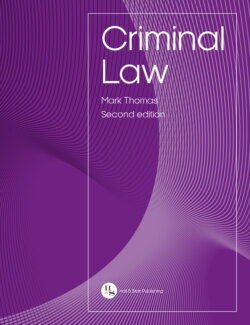Читать книгу Criminal Law - Mark Thomas - Страница 28
На сайте Литреса книга снята с продажи.
Convention rights
ОглавлениеUnlike domestic legislation or the common law, which sets out the offences that an individual may commit and the defences they may equally plead to a charge, the ECHR sets out a number of ‘Convention rights’ that apply to all natural persons. Table 1.2 lists these rights and considers examples of their application in the criminal law.
Table 1.2 Convention rights under the ECHR
| Article | Application |
| Article 2: Right to life | All persons are granted the right to life and the protection of such right by the state.In cases where a defendant kills another in self-defence, the law has to be interpreted in light of Article 2. |
| Article 3: Prohibition of torture | All persons are granted the freedom from torture and other inhuman and degrading treatment. Whether the chastisement of children (by parents or those responsible for children (eg teachers in schools)) falls within the prohibition in Article 3 has long been the subject of argument. Torture is a criminal offence under s 134 of the Criminal Justice Act 1988. |
| Article 4: Prohibition of slavery | All persons are granted the freedom from slavery and other forms of forced labour. Slavery is now criminalised under s 1 of the Modern Slavery Act 2015, which is particularly relevant in the context of human trafficking and sexual exploitation. |
| Article 5: Right to liberty | All persons are granted the right to liberty and security. Article 5 is particularly relevant in terms of pre-trial imprisonment and detention pending trial and is also relevant regarding the state’s obligations to those found to be legally insane. |
| Article 6: Right to a fair trial | All persons are granted the right to a fair trial and to have their case heard and decided by an impartial tribunal. This right grants the presumption of innocence to a defendant and enforces obligations on the prosecution to prove the case against the defendant. |
| Article 7: Prohibition on retrospective law | All persons are granted the freedom from retrospective application of laws. Article 7 also requires sufficient clarity and consistency in the law and a minimised allowance of discretion. |
| Article 8: Right to private life | All persons are granted the right to private and family life. This right means that the life of an individual cannot be interfered with by another. Such rights include the right to privacy and the protection of personal information. |
| Article 9: Freedom of thought, conscience and religion | All persons are granted the freedom from other persons interfering with their thought or religion. Specific offences have been created to reflect the freedom of religion, eg aggravated offences based on religion or belief. |
| Article 10: Freedom of expression | All persons are granted the freedom of speech and the freedom to express themselves in a particular way. This right must be balanced against the right to privacy in Article 8. |
| Article 11: Freedom of assembly and association | All persons are granted the freedom to assemble. Article 11 is particularly relevant where the defendant is liable for a public order offence involving the assembly of more than one person (eg riot). |
| Article 12: Right to family life | Further to Article 8, all persons are granted the right to family life. One debate focuses on whether unmarried couples should be treated differently under the law to married couples. |
| Article 13: Right to an effective remedy | All persons have the right to an effective remedy where an individual’s rights have been breached. Under s 8 of the HRA 1998, a court may grant such relief or remedy as it considers just and appropriate where it finds that an act by a public authority is unlawful. |
| Article 14: Right to non-discrimination | All persons have the right not to be discriminated against in terms of their Convention rights. |
By s 6 of the HRA 1998, it is unlawful for ‘public authorities’ to violate any Convention right or act in a way that is incompatible with a Convention right. ‘Public authority’ includes courts and tribunals and private individuals and organisations performing public functions (s 6(3)(b)) but does not include either House of Parliament (s 6(3)).
